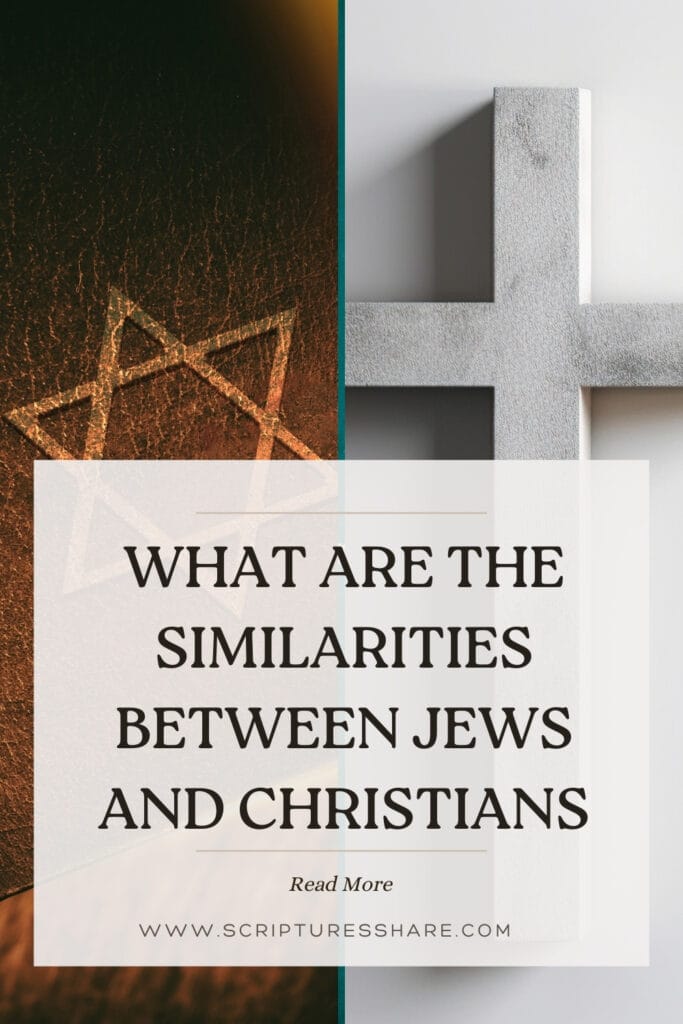No products in the cart.
What Are The Similarities Between Jews And Christians
This post contains paid and/or affiliate links. I make a small commission at no extra cost to you. Please see our Privacy Policy.
Judaism and Christianity share many similarities in their beliefs and practices. These similarities come from their shared history, texts, and ethical values. Both faiths believe in one true God, as stated in the Hebrew Bible.
Both Jews and Christians believe in monotheism. This means they believe in only one God. They trace this belief back to the Hebrew Bible, also known as the Old Testament in Christianity.
| Shared Beliefs | – Belief in the one true God of Abraham, Isaac, and Jacob<br>- Shared core beliefs and values | – Belief in the one true God of Abraham, Isaac, and Jacob<br>- Shared core beliefs and values |
| Sacred Texts | – Reverence for the Hebrew Bible (Old Testament)<br>- Sacred scriptures containing divine teachings | – Reverence for the Hebrew Bible (Old Testament)<br>- Sacred scriptures containing divine teachings |
| Monotheistic Faith | – Belief in the existence of only one God<br>- Shared monotheistic belief shapes their understanding of the world | – Belief in the existence of only one God<br>- Shared monotheistic belief shapes their understanding of the world |
| Celebrating Festivals | – Observance of religious festivals with deep cultural significance<br>- Essential for reflection and spiritual renewal | – Observance of religious festivals with deep cultural significance<br>- Essential for reflection and spiritual renewal |
| Importance of Family and Community | – Strong emphasis on family ties and traditions<br>- Communal worship and participation in religious rituals | – Strong emphasis on family ties and traditions<br>- Communal worship and participation in religious rituals |
| Ethics and Morality | – Emphasis on ethical behavior and moral values<br>- Shared principles guide believers in leading righteous lives | – Emphasis on ethical behavior and moral values<br>- Shared principles guide believers in leading righteous lives |
Jews and Christians also share a deep respect for sacred scriptures. They see the Hebrew Bible as a source of divine revelation, even if they interpret it differently.
For Christians, the Old Testament is a precursor to the New Testament, which includes Jesus’ teachings. Jews, on the other hand, focus on the Torah, the first five books of the Hebrew Bible, as the foundation of their faith.
Both Jews and Christians value ethical behavior and moral conduct. They believe in loving one’s neighbor, pursuing justice, and showing compassion. These teachings guide them to live righteous lives.
Another key similarity is their communal worship and rituals. Jews and Christians come together for prayer services, holidays, and rites of passage. These gatherings strengthen their sense of community and devotion to God.
Both faiths also cherish their traditions and cultural heritage. These traditions shape their identities and practices, connecting them to their past.
These traditions help Jews and Christians feel connected to their shared history and experiences. They reinforce their sense of continuity and community.

Jews and Christians share a deep bond in their beliefs and practices. They both believe in one God, value sacred scriptures, and follow ethical principles. They also worship together and share cultural traditions.
Even though they have different beliefs, their shared history and values are strong. These commonalities have shaped their lives for centuries.
Shared Scriptures between Jews and Christians
Jews and Christians have a long and complex relationship. Exploring their similarities shows a deep bond. This bond goes beyond their differences and historical conflicts.
Let’s look at their historical ties and shared scriptures.
Historical Connections
The history between Jews and Christians goes back to ancient times. Christianity started from Judaism in the 1st century AD. Jesus and his followers were Jewish.
The New Testament is based on Jewish traditions and teachings. Their shared history of persecution has shaped their relationship.
Throughout history, Jews and Christians have faced both conflict and cooperation. From the Roman occupation to the Crusades, they have had ups and downs. The Holocaust highlighted the need for mutual respect.
Shared Scriptures
Jews and Christians share the Hebrew Bible, also known as the Old Testament. Both faiths see these texts as sacred. The Hebrew Bible includes the Torah, Prophets, and Writings.
Figures like Abraham, Moses, and King David are important in both traditions. Stories like the Exodus and the Psalms are deeply meaningful to both faiths.
Interpretations and Differences
While they share scriptures, Jews and Christians interpret them differently. Christians believe Jesus is the Messiah, a belief that sets them apart from Judaism.
They also have different views on laws and teachings in the Hebrew Bible. These differences have led to different beliefs and practices.
Despite their shared scriptures, Jews and Christians have different interpretations. This has led to diverse beliefs within each faith.
For example, Christians believe Jesus is the Messiah. This belief is central to Christian theology and different from Judaism.
They also have different views on laws and commandments. This has led to different religious practices and traditions.
Despite their differences, their shared history and scriptures are a foundation for understanding. This can lead to greater dialogue and cooperation.
Continuing Dialogue and Understanding
In recent times, Jews and Christians have worked together more. They have joined in interfaith initiatives and social justice efforts. This has fostered greater understanding and respect.
By recognizing their shared history and values, they can build bridges. This can lead to a more peaceful and inclusive society. Embracing their similarities can create deeper connections in our diverse world.
Cultural Traditions and Festivals in Jewish and Christian Communities
Cultural traditions and festivals are important in both Jewish and Christian communities. While they have different beliefs, they share a common heritage and values.
Shared Beliefs
Judaism and Christianity both come from the Old Testament. They believe in the one true God of Abraham, Isaac, and Jacob. They also value leading a moral life, showing kindness, and seeking forgiveness for wrongdoings.
Sacred Texts
Both Jews and Christians respect the Hebrew Bible, known as the Old Testament. They see these texts as sacred, filled with divine teachings and guidance.
Monotheistic Faith
Judaism and Christianity are monotheistic religions. They believe in only one God. This belief shapes their faith and view of the world.
Celebrating Festivals
Jews and Christians celebrate many festivals each year. For example, Jews mark Passover, while Christians celebrate Easter. These festivals are key for reflection and spiritual growth.
Passover for Jews and Easter for Christians are important. They unite believers in worship and prayer. These festivals strengthen their shared faith and heritage.
Importance of Family and Community
Family is vital in both Jewish and Christian faiths. They value strong family bonds and support each other. Communal worship and religious rituals also unite believers.
Ethics and Morality
Both Judaism and Christianity emphasize ethics. The Ten Commandments guide believers to live righteously. They encourage kindness and charity, promoting integrity and compassion.
Despite differences, Judaism and Christianity share many values. Recognizing these similarities can foster understanding and respect between them.
Embracing these shared values can bring harmony between Jewish and Christian communities worldwide.
The Evolution of Jewish-Christian Relations over Centuries
The journey of Jewish-Christian relations has been complex. It has been shaped by history, theology, and politics. Despite their differences, Jews and Christians share many similarities that have influenced their interactions.
Historical Roots
Jews and Christians share a common heritage in the Abrahamic tradition. They consider Abraham a patriarch and share stories from the Hebrew Bible. This shared heritage is the foundation of their religious identities and fosters mutual understanding.
Monotheistic Beliefs
One key similarity is their belief in monotheism – the worship of one God. This belief unites them and distinguishes them from other religions. Monotheism has been a cornerstone of their theology, creating a spiritual bond between them.
Ethical Values
Both Judaism and Christianity emphasize ethical values and moral conduct. They share principles like justice, compassion, and righteousness. These values guide their actions and relationships with others.
Their shared ethical framework has led to mutual respect and cooperation. They work together in social and humanitarian endeavors.
Sacred Scriptures
Jews and Christians both value sacred scriptures. The Hebrew Bible is key for Jews, while Christians include the Old Testament in their canon. This shared scripture is a common ground for dialogue and study.
It fosters mutual engagement and scholarly exchange between the two traditions.
Messianic Expectations
Though Jews and Christians differ on the Messiah’s identity, they share messianic expectations. They both look forward to a future redeemer who will bring salvation and establish God’s reign. This shared hope highlights their spiritual affinity.
Their shared hope for a messianic age shows their spiritual connection.
The similarities between Jews and Christians create a framework for understanding and collaboration. They can cultivate mutual respect, dialogue, and cooperation by recognizing their shared heritage, beliefs, and values.
Their evolving relationship reflects a journey of discovery, reconciliation, and shared humanity. It transcends historical divisions and fosters unity in diversity.
Shared Values and Ethics in Judaism and Christianity
Jews and Christians share historical and religious roots despite their differences. Both faiths trace their origins to the ancient Israelites and revere the same texts, like the Hebrew Bible.
Modern interpretations highlight their common values, such as compassion, justice, and ethical living.
Historical Connection
Judaism and Christianity have a deep historical connection. Christianity emerged from Judaism, with Jesus and his followers being Jewish. This connection forms a basis for their shared ethical teachings and value systems.
Both religions recognize the importance of figures like Abraham and Moses. This reinforces their shared heritage and beliefs.
Monotheistic Beliefs
Both Judaism and Christianity believe in one God. This belief is central to their faith and influences their ethics. The emphasis on a single, omnipotent deity leads to a convergence in moral teachings.
This shared monotheistic belief fosters a common ground for ethical discourse and interfaith dialogue.
Ethical Principles
Judaism and Christianity emphasize ethical conduct and moral responsibility. The Golden Rule is fundamental to both faiths. It urges individuals to treat others as they want to be treated.
Their ethical imperatives of justice, charity, and integrity reflect a shared commitment to living a moral and virtuous life.
Social Justice and Compassion
Both Jews and Christians emphasize social justice and compassion. They advocate for human rights, care for the less fortunate, and support the oppressed. Their shared values of tikkun olam (repairing the world) and the mandate to love one’s neighbor show their joint commitment to social welfare and justice.
Interfaith Dialogue and Cooperation
In today’s world, Jews and Christians are working together more than ever. They are learning to appreciate their similarities.
Through talks and joint projects, they aim to bridge their differences. They focus on the values that unite them. This effort helps in building a more peaceful and united society.
Jews and Christians share many values and principles. They recognize their common heritage and beliefs. This understanding helps them build strong relationships and work towards a better world.
Final Thoughts:
Jews and Christians have more in common than we think. They share a rich cultural heritage. Their traditions and celebrations connect them across time.
Events like Passover and Easter show their deep faith and respect for heritage. These festivals reflect a profound reverence for their faiths.
For centuries, Jews and Christians have had a complex relationship. They have faced both harmony and conflict. Yet, they value mutual respect and dialogue to build harmony.
Looking to the future, they can work towards peace and cooperation. Acknowledging their past and embracing reconciliation is key.
Today, there’s a focus on applying their shared values to modern issues. Social justice, compassion, and righteousness are core to both faiths. These values guide them in tackling today’s challenges.
By using these ethical principles, Jews and Christians can work together. They can promote human rights, dialogue, and social welfare. This reflects their shared goal of creating a more just and compassionate world.
The bond between Jews and Christians is strong. It goes beyond theology and history to shared beliefs and values.
Recognizing these connections fosters respect, dialogue, and cooperation. This leads to a more harmonious and inclusive society.
By honoring our shared past and looking to a future of mutual understanding, we can celebrate diversity. We can find unity in our common bonds.















